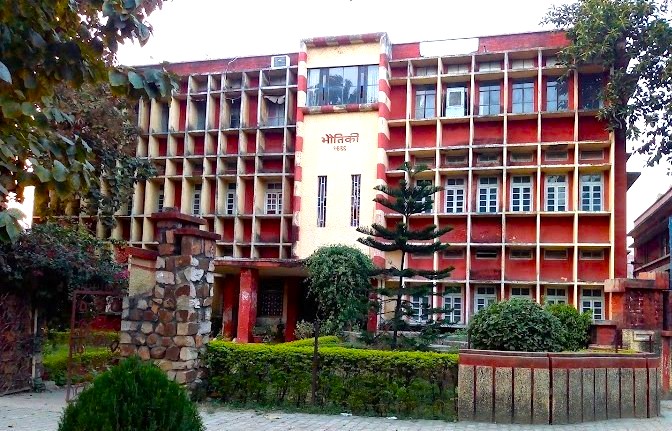Centre for the Study of Religion, Politics and International Relations
About the Centre
The Centre for the Study of Religion, Politics and International Relations (CSRPI) is a research facility that is advanced, interdisciplinary within the broad scope of the Sundar Singh Institute of South Asian Studies. CSRPI was funded through an arrangement with the government and core funding from the Ministry of Home Affairs. It functions, at a national, and regional level, as a site for critical scholarship at the intersection of theology, political theory, and international politics.

Institutionally, CSRPI aims to interrogate the yawning relationships between religious worldviews, political authority, and geopolitical processes. While these relationships are inextricably linked to processes occurring in South Asia, we also intend CSRPI’s output to provide comparative, and global insights about the interrelatedness across these domains.
Research Agenda and Themes
CSRPI’s research agenda is comprised of four intersecting themes that combine many relevant disciplines:
1. Political Theology and Governance Ethics
Investigates normative foundations and theological genealogies of power, legitimacy, and public law in constitutional democracies and authoritarian regimes in South Asia, including comparative studies of civil religion, religious jurisprudence, and political liturgy.
2. Religion, Conflict and Peacebuilding
Examines religious identities and institutions as sources of communal conflict and agents of reconciliation, in fragile, and post conflict societies. The Centre analyses interfaith diplomacy, transitional justice, and scriptural reasoning in peacebuilding, as well as actors and interests that impede, or disrupt the advancement of sustainable peace.
3. Sacred Geographies and Transnational Mobilities
Maps a range of spatialities including religious nationalism, pilgrimage economies, transnational (border crossing) devotion, and diaspora communities. This cluster examines how sacred imaginaries and social engagements converge in the making of national confines, migration, and global religious movements, and engages with the tokengenic role of religion as an institutional modality in the erratic flows of global religious trade and religious-humanitarian practice.
4. Religion in International Political Economy and Development
Through the study of spiritual/economic capital, development ethics cold religious actors within policy discourses of welfare provision, environmental justice, and economic redistribution, this cluster is ambitiously producing recommendations to think usefully about post-colonial South Asia, and imaginings of global social forces and their currents.
The Centre welcomes/sustains a range of epistemologies (e.g. ethnography, archival historiography, discourse analysis, and normative political theory) as well as a range of methodologies (and political theories) (e.g. critical sociology, and de-colonial) and wishes to offer and support opportunities for intellectual exchange and the creation of spaces for people engaged with helping shape those responses to disciplines constitutively different, within the ambit of political science, religious studies, theology, international relations, anthropology, and law, which continue to be fundamentally separated, measured against publicly presented intellectual languages within those disciplines.
5. Relevance to South Asia and Globally
The socially constructed reality of living in a world where there exists an upward shift in religio-political movements, bolstered identity claims, and the contemporary breaking down of the secular public sphere, significantly shapes how life is lived and perceived in relation to the contemporary world order. CSRPI marks itself a significant space for rethinking socio-analysis of religiousity in the world order and its relations. The Centre’s work is especially significant to South Asia and in thinking through the implications of distinctive civilizational legacies and negotiated modernities, and it contributes theorized ideas derived from or specific to the region, rather than merely fit to the region.
The projects of the Centre are important for practitioners as professionals in international development, or non-profit and philanthropy, civil leadership, civil action, aside from religion. CSRPI is in a position to be at the forefront of this public-like scholarly level of work that has a theoretical professional connection but is not limited to, structure(s) existing in public scholarship and epistemic/epistemological justice.
Leadership
The Centre is led by The Rt Revd Dr Isaac Shunsuke Sato, who is a scholar-practitioner who works at the intersections of varying, and often overlapping, themes: a variety of religious ethics, public theology, and Christian social thought; scholarly disciplines and discourses not especially recognized for the intellectual leadership it cultivates, which is not least modeled by Dr Sato’s style of positive and open strategic engagement, which may continue to bolster and highlight the Centre’s intellectual leadership. Before coming to CSRPI, Dr Sato was the Acting Director of the Sundar Singh Institute, and he was more than an academic job, he was the facilitator of the Institute’s rendering of a research orientation as it relates to taking up global challenges and related public purpose wrought from a range of more and often public policy related interests.
Engagement and Strategic Partnerships
CSRPI partners actively with leading universities and research institutes, organizations, think tanks, and multilateral agencies. In CSRPI’s public engagement events, closed-door roundtables, and visiting fellows programs, scholars, diplomats, clergy and community practitioners exchange knowledge, ideas, experiences and lessons learnt together. The Centre has had new career researchers take part in their public scholarship events and also invites them to participate as students independently towards graduation in their doctoral levels, as well as through further opportunities in senior level seminars and field-based policy labs.
Contact
For academic or media enquiries, partnership proposals, or to request a research consultation, please contact:
Ms Aditi Sharma
CSRPI’s Secretary
Centre for the Study of Religion, Politics and International Relations
712, Mutthiganj Rd, Mutthi Ganj, Prayagraj, Uttar Pradesh 211003
